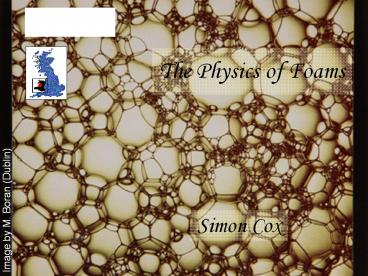The Physics of Foams - PowerPoint PPT Presentation
Title:
The Physics of Foams
Description:
metallic grain growth, biological organisms, crystal structure, ... Also work on fly eyes (Carthew) and sea urchins (Raup, D'Arcy Thompson) Conformal Foams ... – PowerPoint PPT presentation
Number of Views:540
Avg rating:3.0/5.0
Title: The Physics of Foams
1
The Physics of Foams
Image by M. Boran (Dublin)
Simon Cox
2
Outline
- Foam structure rules and description
- Dynamics
- Prototypes for many other systems
- metallic grain growth,
biological organisms, crystal
structure,
emulsions,
3
Motivation
- Many applications of industrial importance
- Oil recovery
- Fire-fighting
- Ore separation
- Industrial cleaning
- Vehicle manufacture
- Food products
4
Dynamic phenomena in Foams
Must first understand the foams structure
5
What is a foam?
- Depends on the length-scale
- Depends on the liquid content
- hard-spheres, tiling of space,
6
How are foams made?
from Weaire Hutzler, The Physics of Foams
(Oxford)
7
Single bubble
Soap film minimizes its energy surface
area Least area way to enclose a given volume is
a sphere. Isoperimetric problem (known to
Greeks, proven in 19th century)
8
Laplace-Young Law
(200 years old)
Mean curvature C of each film is balanced by the
pressure difference across it
Coefficient of proportionality is the surface
tension
Soap films have constant mean curvature
9
Plateaus Rules
- Minimization of area gives geometrical
constraints (observation Plateau, proof
Taylor) - Three (and only three) films meet, at 120, in a
Plateau border - Plateau borders always meet symmetrically in
fours (Maraldi angle).
10
Tetrahedral and Cubic Frames
Plateau
For each film, calculate shape that gives surface
of zero mean curvature.
11
Bubbles in wire frames
DArcy Thompson
12
Ken Brakkes Surface Evolver
The Surface Evolver is software expressly
designed for the modeling of soap bubbles, foams,
and other liquid surfaces shaped by minimizing
energy subject to various constraints
http//www.susqu.edu/brakke/evolver/
13
Two-dimensional Foams
Lawrence Bragg Cyril Stanley
Smith (crystals)
(grain growth)
Plateau Laplace-Young in equilibrium, each
film is a circular arc they meet three-fold at
120.
Energy proportional to perimeter
14
Topological changes
- T1 neighbour swapping
(reduces perimeter)
- T2 bubble disappearance
15
Describing 2D foam structure
- Eulers Law
- Second moment of number of edges per bubble
16
Describing foam structure
Aboav-Weaire Law where m(n) is the average
number of sides of cells with n-sided
neighbours. Applied (successfully) to many
natural and artificial cellular structures. What
is a?
17
(No Transcript)
18
2D space-filling structure
Honeycomb conjecture Hales Fejes-Toth
19
Finite 2D clusters
Find minimal energy cluster for N bubbles. Proofs
for N2 and 3.
Morgan et al. Wichiramala
How many possibilities are there for each N?
20
Work with Graner (Grenoble) and Vaz (Lisbon)
Candidates for N4 to 23, coloured by topological
charge
21
200 bubbles
Honeycomb structure in bulk what shape should
surface take?
22
Lotus flowers
Tarnai (Budapest)
Seed heads represented by perimeter minima for
bubbles inside a circular constraint? Also work
on fly eyes (Carthew) and sea urchins (Raup,
DArcy Thompson)
23
Conformal Foams
Drenckhan et al. (2004) , Eur. J. Phys.
Bilinear maps preserve arcs of circles
Conformal map f(z) preserves angles (120º)
Equilibrium foam structure mapped onto
equilibrium foam structure
f(z) e z
Logarithmic spiral
24
Gravitys Rainbow
Drenckhan et al. (2004) , Eur. J. Phys.
Setup
Theoretical prediction
Experimental result
rotational symmetry
translational symmetry
w (ia)-1log(iaz)
w z1/(1-?)
25
Ordered Foams in 3D
(Elias, Hutzler, Drenckhan)
26
Description of 3D bulk structure
- Topological changes similar, but more
possibilities. - restricts possible regular structures.
- Second moment
- Sauter mean radius
(polydisperse) - Aboav-Weaire Law
(Euler, Coxeter, Kusner)
27
3D space-filling structure
Polyhedral cells with curved faces packed
together to fill space. Whats the best
arrangement? (Kelvin problem) Euler Plateau
need structure with average of 13.39 faces and
5.1 edges per face
14 delicately curved faces (6 squares, 8
hexagons) ltEgt5.14
See Weaire (ed), The Kelvin Problem (1994)
Kelvins Bedspring (tetrakaidecahedron)
28
Weaire-Phelan structure
Kelvins candidate structure reigned for 100
years WP is based on A15 TCP structure/
ß-tungsten clathrate ltFgt13.5, ltEgt5.111 0.3
lower in surface area
2 pentagonal dodecahedra 6 Goldberg 14-hedra
Swimming pool for 2008 Beijing Olympics (ARUP)
Surface Evolver
29
3D Monodisperse Foams
nergy
Matzke
Quasi-crystals?
30
Finite 3D clusters
Find minimal energy cluster for N bubbles. Must
eliminate strange possibilities
J.M.Sullivan (Berlin)
Proof that obvious answer is the right one for
N2 bubbles in 3D, but for no greater N.
31
Finite 3D clusters
27 bubbles surround one other
DWT
Central bubble from 123 bubble cluster
32
Dynamics
Coarsening Drainage Rheology
Graner, Cloetens (Grenoble)
33
Coarsening
Gas diffuses across soap films due to pressure
differences between bubbles.
Von Neumanns Law - rate of change of area due to
gas diffusion depends only upon number of sides
T1 s and T2 s
Only in 2D. Also applies to grain growth.
34
Coarsening
In 3D,
Stationary bubble has 13.39 faces
35
Foam Rheology
- Elastic solids at low strain
- Behave as plastic solids as strain
increases - Liquid-like at very high strain
- Exploit bubble-scale structure (Plateaus laws)
to predict and model the rheological response of
foams. - Energy dissipated through topological changes
(even in limit of zero
shear-rate). - Properties scale with average bubble area.
36
2D contraction flow
J.A. Glazier (Indiana)
37
Couette Shear (Experiment)
Much faster than real-time.
Experiment by G. Debregeas (Paris), PRL 01
Shear banding? Localization? cf Lauridsen
et al. PRL 2002
38
Couette Shear Simulations
Quasistatic Include viscous drag on
bounding plates
39
Outlook
This apparently complex two-phase material has a
well-defined local structure. This structure
allows progress in predicting the dynamic
properties of foams
The Voronoi construction provides a useful
starting condition (e.g. for simulations and
special cases) but neglects the all-important
curvature.































